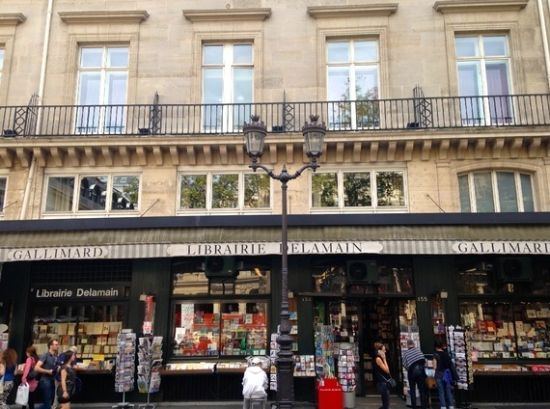双语:法国文化部长承诺拯救巴黎最古老书店
 巴黎德拉曼书店(Librairie Delamain)
巴黎德拉曼书店(Librairie Delamain)Nestled between cafés and tour shops on the busy Rue Saint-Honoré, the Librairie Delamain, the oldest bookstore in Paris, strikes an inconspicuous pose. Outside, tourists jostle their way through the stands and shelves on their way from the Louvre to the Comédie Française across the street, rarely pausing to glance under the gray-and-white awning。
The tempo inside the bookstore is slower, as patrons—almost all French—vie for browsing space among the cramped shelves. The president of the Constitutional Council, Jean-Louis Debré, is a regular visitor; so is Comédie-Française actor Denis Podalydès. Over the years, Michel Foucault, Colette, and Jean Cocteau have all passed through its doors。
But Librairie Delamain may now be coming to a close. This month, the Librairie Delamain's lease is up for renewal by the Qatari company Constellation Hotel Holdings, which owns the block-wide property that also houses the soon-to-be-renovated Hôtel du Louvre. The company plans to double the bookstore's rent to 100,000 euros per year—nearly a tenth of their annual revenue. With already slim margins, the shop would be forced to shut down or abandon the storefront where it has been since 1906 (the business itself dates to 1700)。
This tale is a familiar one to bibliophiles around the world, as the frail arsenals of independent bookstores surrender to the triple threat of Amazon, e-books, and competition from other media. Here in France, though, the story diverges from the script. Barely had the threat to Delamain been announced when author and journalist Angelo Rinaldi pledged to do all he could to prevent the bookstore's closing. "It's always when grandmother is sick that you realize how much you loved her," he told LeFigaro last week. Rinaldi plans to spread the word among his colleagues at the Académie Française when it reconvenes on September 25.
Rinaldi was joined by the Minister of Culture herself, Fleur Pellerin, who visited the bookstore in person to assure the staff of her full support. The president of the Centre National du Livre, Vincent Monadé, demanded a meeting with Constellation Hotel Holdings. Several days later, the Hôtel du Louvre, feeling the pressure, released a statement saying that the Qatari holding company would take into consideration "the specific activity of its renter as well as the many years in which it has occupied the site."
"I hope, now, that this is going to be translated into action," said Monadé to LeFigaro。
It's difficult to imagine the shuttering of a bookstore causing a similar outcry anywhere else—not to mention direct government involvement in the matter of a private lease. This has something to do with what the French call l'exception culturelle. It doesn't just mean cultural exceptionalism; the phrase refers more precisely to the notion that cultural goods should not be subject to the whims of the free market—and should be protected from the homogenizing onslaught of global, and in particular American, cultural imperialism。
In the U.S., such a policy would smack of protectionism. The French prefer to justify it in terms of maintaining "cultural diversity." L'exception culturelle is the source of production quotas for radio programs made in France. It's the reason the initial arrival of Netflix executives in France was met with a letter from producers bemoaning the "implosion of our cultural model." And in a more general sense, it is part of a conviction in France—albeit one increasingly debated—that cultural heritage is a good with its own internal logic and value system, one that the government has the duty not only to protect but to actively promote. France even entombs its most celebrated literary and cultural figures, among other "great men" (and now women), in the Panthéon in Paris。
In the publishing sphere, l'exception culturellemorphs from a committed ideal into concrete policy. It has allowed the French to mount a challenge to the digital revolution in a way that would be unimaginable in the U.S。
As an independent bookstore, the Librairie Delamain already receives a partial merchandising subsidy—5,000 euros in 2013—from the Centre National du Livre.In 2013, the Ministry of Culture announced a further injection of 5 million euros into the independent bookstore industry, as well as the creation of a new bureaucratic position (the stereotypical solution to all French problems)—the "book arbitrator"—who could, in cases like this one, intervene in legal disputes without forcing the small businesses to involve themselves in expensive litigation. Booksellers like Delamain are also aided by theloi Lang,a 1981 law named after a former minister of culture, which limits discounts on books to 5 percent of their cover price. Earlier this summer, a so-called "anti-Amazon" amendment extended this limit to online booksellers and prohibits them from offering free shipping on reduced-price books。
In fact, France is far from the only country to require a fixed book price. Germany, Norway, Japan, Mexico, and South Korea all do as well. The U.K. used to require fixed book prices, but no longer does. Today, one can easily see the result: While independent booksellers make up 45 percent of the market in France, they are only 4 percent of the total in the U.K. In 2013, 23 percent of all trade books purchased in the U.S. were e-books (it's 25 percent in the U.K。) – in France the number was a fraction of that, at 3 percent。
巴黎德拉曼书店(Librairie Delamain)是巴黎最古老的书店,它坐落在繁华的圣奥诺雷街(Rue Saint-Honoré),藏于咖啡馆和旅游商店之间,是那样的不起眼。店外,游客熙熙攘攘,他们穿过沿路的小摊、货架,从卢浮宫前往法兰西剧院(Comédie Française),却鲜有人驻足片刻,留意到这片灰白色雨篷下的天地。
店内的节奏比店外要慢几拍,顾客们(几乎都是法国人)在局促的书架间争夺着阅览空间。法国宪法委员会主席让-路易·德勃雷(Jean-Louis Debré)时常光顾于此。法兰西剧院演员德尼·波达利德斯(Denis Podalydès)亦是常客。这些年间,米歇尔·福柯(Michel Foucault)[1]、柯莱特(Colette)[2]、让·谷克多(Jean Cocteau)[3]都曾踏入这家书店的大门。
但是,德拉曼书店如今可能面临关门。本月,书店与卡塔尔公司星座酒店集团的租约到期。这家公司拥有本街区的全部物业,包括翻修在即的卢浮宫酒店。公司打算将书店的租金翻番,涨到每年10万欧元,这几乎等于书店年收入的一成。本就盈利甚微,书店也许只能被迫关闭或放弃临街的店面。书店自1906年便在这此经营(其业务则可追溯到1700年)。
脆弱的独立书店屈服于来自亚马逊、电子书和其他媒体的三重竞争压力,这样的故事对于世界上的爱书之人并不陌生。而在法国,故事的套路却有所不同。作家兼记者安吉罗·里纳尔迪(Angelo Rinaldi)承诺尽全力不让书店倒闭,因此德拉曼书店几乎未受到影响。他上周对《费加罗报》(Le Figaro)说道:“总要到祖母生病时你才意识到你有多爱她。”里纳尔迪计划于9月25日法兰西文学院(Académie Française)复会时在他的同事中宣传此事。
法国文化部长福乐尔·佩勒林(Fleur Pellerin)也加入到里纳尔迪的队伍中来。她亲自访问了德拉曼书店,并向店员保证她将全力支持他们。法国国家图书出版中心主任文森特·莫那德(Vincent Monadé)也要求与星座酒店集团面谈此事。几天后,迫于压力,卢浮宫酒店发表声明,称卡塔尔控股公司将会考虑“租客(德拉曼书店)活动的特殊性,以及它已在此经营多年的事实”。
莫那德对《费加罗报》说:“现在,我希望他们付诸行动。”
由一家书店的关张引发强烈抗议,这在其他国家是不可思议的事情,更别提政府直接介入私人租约事务了。这与法国人所谓的“文化例外”有关。此提法不单指文化例外主义,更确切地讲,它的涵义是:文化商品不应成为自由市场一时头脑发热的牺牲品,而应受到保护,使之免遭全球(尤其是美国)文化帝国主义的同质化屠戮。
在美国,这样的政策颇有保护主义之嫌。法国人则更喜欢为其正名,称之为保护“文化多样性”。“文化例外”是法国电台节目必不可少的素材。这也解释了为什么网飞公司(Netflix)总裁初访法国时,迎接他的是来自制片人的一封悲叹“文化模式崩溃”的信。更广义上讲,这是法国信念的一部分(虽说它已引发越来越多的争议)。在这种信念里,文化遗产是具有自身内在逻辑和价值体系的商品,政府不仅有责任保护文化,更应该积极弘扬文化。法国甚至将本国最负盛名的文学和文化名人安葬于“伟人”安息之所—巴黎先贤祠(Panthéon)。
在出版界,“文化例外”从理想承诺转变为切实政策,让法国人向数字革命提出挑战,而这在美国是无法想象的事。
作为独立书店,德拉曼书店得到了来自法国国家图书出版中心的部分商品补贴(2013年补贴金额为5000欧元)。2013年,法国文化部长宣布再向独立书店行业注资500万欧元,并新设官方职位(这是解决所有法国问题的老套路)——“图书仲裁人”,在诸如此类案件中介入法律争端,使小书店免于陷入昂贵的诉讼。德拉曼书店这样的书商还受到《朗法》(loi Lang)的支持,该法律以法国前文化部长杰克·朗的名字命名,于1981年颁布。《朗法》规定,图书折扣不得超过其标价的5%。今年初夏,所谓的“反亚马逊”修正法案将这一限定延伸到网络书店,并禁止其对减价书籍包邮。
事实上,法国绝不是唯一要求实行固定图书价格[4]的国家。德国、挪威、日本、墨西哥和韩国也是这样做的。英国也曾有过固定图书价格的规定,但现已不再执行。如今,后果一目了然:法国的独立书店占到市场的45%,而英国的这一比例则仅有4%。2013年,美国售出的普通版图书中23%是电子书(英国为25%),而法国的这一比例极低,仅为3%。

